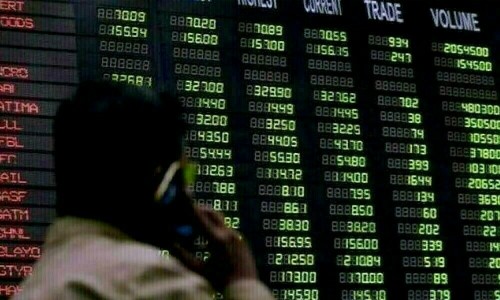Market Faces Pressure Amid Geopolitical Concerns
The Pakistan Stock Exchange (PSX) experienced selling pressure as geopolitical tensions intensified following recent events. Investor apprehension grew, leading the benchmark KSE-100 Index to decline by over 1,900 points during Monday’s trading session.
At approximately 11:30 am, the KSE-100 Index was recorded at 118,111.26, reflecting a decrease of 1911.97 points, equivalent to a 1.59% drop.
A statement from Topline Securities CEO, noted that Pakistani stocks commenced trading with a substantial decrease of 1,700 points, or 1.4%, amidst ongoing geopolitical unease.
Widespread Selling Noted
Broad selling activity was seen across the board, particularly impacting key sectors such as automobile manufacturing, oil and gas exploration, oil marketing companies (OMCs), power generation, and commercial banking. Major stocks including OGDC, PPL, POL, HUBCO, and PSO all traded in negative territory.
Last week, the PSX experienced volatility due to increasing geopolitical tensions in the Middle East, fluctuations in international commodity prices, and mixed domestic economic data, which negatively affected investor confidence.
The KSE-100 Index retreated significantly from recent peaks, closing the week at 120,023.23 points, a 1.7% decrease from the previous week’s close of 122,143.57 points.
Global Market Overview
Across Asia, shares declined, and oil prices briefly reached a five-month high as investors were concerned about potential retaliatory measures and the ensuing impact on global economic activity and inflation.
Initial market reactions were measured, with only a slight increase in demand for the dollar as a safe-haven asset and no widespread panic selling.
Oil prices increased by around 2.8%, but remained below their initial highs.
There were hopes that de-escalation could happen, or that a change in government might bring a less hostile administration to power.
Strait of Hormuz Key
Crucial is accessibility through the Strait of Hormuz, a narrow waterway approximately 33 km wide, which is vital for about a quarter of global oil trade and 20% of liquefied natural gas supplies.
Currently, Brent crude is up by 2.7% at $79.12 per barrel, while U.S. crude increased by 2.8% to $75.98.
Gold prices saw a slight decrease of 0.1%, trading at $3,363 an ounce.
Stock markets have shown resilience thus far, with S&P 500 futures down by 0.5% and Nasdaq futures down by 0.6%.
MSCI’s index of Asia-Pacific shares excluding Japan decreased by 0.5%, while Japan’s Nikkei fell by 0.9%.
Europe and Japan rely heavily on imported oil and LNG, whereas the United States is a net exporter.
This information reflects an intra-day market update.



Comments (0)
No comments yet. Be the first to comment!
Leave a Comment